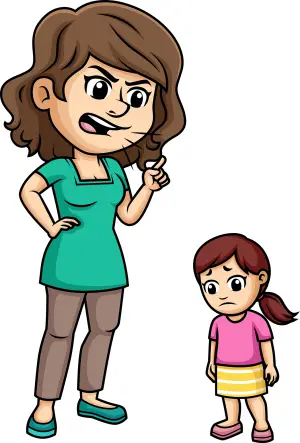Debate surrounds the recent phenomenon of ‘designer babies‘ in which parents choose their child’s sex before birth. Debate aside, this medical advancement has brought to light that some parents prefer one sex over the other. So when parents don’t love daughters like sons, for instance, what should be done?
It’s actually more common for parents to prefer sons according to scientific polls. Sometimes parents are unintentional in their disparity, and other times it’s deliberate. While daughters can hold some responsibility, it’s typically parents who are key for resolving this family dysfunction.

As a mom of three sons and one daughter, as well as being a daughter with three brothers, I know firsthand the differences and similarities between sons and daughters. In addition, my extensive teaching background has provided me with a unique perspective on boys versus girls.
I’ll address what I’ve learned about boys versus girls, as well as my thoughts on raising sons and daughters. I’ll also tackle why some parents don’t love daughters, and how to deal with that painful family situation.
Contents
What makes some parents not love their daughters like their sons?
After learning you’re going to have a baby, usually not far behind are thoughts of whether it will be a boy or a girl. Sadly, though, this information can greatly affect parenting, since some parents don’t love daughters like sons.
Polls since the 1940s have consistently shown parents prefer sons. One reason is the belief that sons will carry on the family name, while daughters won’t. Another theory is that sons are easier to raise and less costly. However, these are misconceptions, and situations vary for each family.

A 2008 study focused on the parental preference for sons extensively using data compiled over four decades. The findings were published in The Demand for Sons.
Dalh and Moretti
Reason 1 for Preferring Sons Over Daughters = Family Name
One common reason for wanting sons is to preserve the family name. While this reason is likely a layover from antiquated times, it’s not unfounded. In fact, The New York Times recently published an article on this exact issue, stating that 70 percent of US women still change their name upon marriage.
And perhaps surprising to many readers, almost 90 percent of British women opt to take their husband’s name.
In other instances, women often hyphenate or use their maiden name as a middle name, in some sort of compromise or retention of personal identity.
You might like these other Little Ninja articles like this one:
- What to Know About Sons Who Hate Their Mothers
- Don’t Love Your Son? (Think Again)
- Dealing With Smart, Stupid Daughters (Mom’s Advice)
- What To Know About Daughters Who Hate Their Fathers
Reason 2 for Not Loving Daughters Like Sons= Daughters are dramatic.
Another common misconception is that daughters are too dramatic and it’s just easier to have sons.
From a birthing standpoint, having daughters is usually healthier than sons. Studies have shown that girls are stronger than boys right after birth and less susceptible to neonatal medical problems.
Then, some believe that daughters just bring more ‘drama’ and emotionalism to parenting. However, again, this is not always the case. In fact, as a teacher, I’ve had years and years of experience teaching boys and girls alike, and can tell you that most everyone would rate boys as ‘more trouble’ in the classroom.
One year as a teacher I participated in a UCLA study on gender in the classroom. This study created gender-defined cohorts of one all girl class; one all boy class; and one mixed-gender (i.e. traditional) class. The teachers found that the girl class was much quieter and ‘controllable’ than the all-boy class, which was loud and difficult for new teachers lacking effective classroom management skills.
Behaviors of rambunctiousness, fighting, talking back, and aggression are much more commonly attributed to boys than girls. In many ways, then, these behaviors could be categorized as being dramatic, and causing frustration from a parenting perspective.
Reason 3 for Not Loving Daughters Over Sons= Daughters Cause More Worry
Another problem some say with having daughters is that they bring more worry than having sons. Though it may seem sexist, parents often worry about daughters’ personal safety as well as issues related to getting pregnant.
Statistics confirm that women are more prone to being victims or experiencing physical harm than their male counterparts, too.
- 1 in 3 women worldwide are victims of sexual or physical violence (WHO)
- 1 in 10 women have been raped (NCADV)
- 1 in 7 women (versus 1 in 18 men) have been stalked
- More single moms are raising kids than single fathers-8.5 million versus 2.6 million (OECD)
However, there are just as concerning statistics about males than females.
- 2.5 percent of men have said they’ve been victims of violent crimes versus 1.7 percent of women (CBS)
- Studies show males are more likely to be homicide victims than females
- Males are more likely to be victims of drug-related crimes too
So parents who prefer sons over daughters for this reason should keep in mind that while it’s true daughters are more commonly victimized than sons for some things, males are more at risk in other areas.
Reason 4 for Parents Preferring Sons Instead of Daughters= Sons Are Less Dependent
Some parents prefer having sons instead of daughters because they view sons are more independent and less needy than having daughters. This is very subjective.
In my personal experience, my three brothers have been much more dependent upon my parents than their only daughter (me). My brothers have worked for my parents; co-mingled their finances and homes; and lived near or with them as adults.
I, on the other hand, have been more independent, having lived in several states away from my childhood home, where my parents continue to live. In fact, I’ve traveled outside the country many times, whereas my brothers rarely go outside the same state as my parents.
As for our own sons and daughter, this situation is replicated. Our sons are independent and well-balanced, but our daughter is ‘independent to the x factor.’ She received a scholarship as a senior in high school and spent that year living abroad.
As well, she went to college over 1,000 miles away, while her older brother lived in her old bedroom and attended community college. She continues her independent streak, living abroad after college as a Fulbright Scholar.
So while all of these reasons can be valid for preferring sons over daughters, just as many reasons can be given to support daughters over sons. All this means is that it’s really preferential, and not exact. It varies from person to person, and family to family.
Is it normal to not like your daughter?
But what if parents don’t like their daughter? Is this a problem; is it normal?
While not exactly normal, parents who don’t like their adult daughters shouldn’t be unduly concerned. Generally this arises as a result of personality conflicts or differences in values. It’s a problem if parents don’t like their underage daughters because that can impact positive parenting.
So to be clear, it’s normal to not like your daughter now and then, but less common for this feeling to last over time or become consistent.
Parents and adult daughters may not like each other if they have personality conflicts like one is outgoing and the other is introverted. It can also be problematic to get along if daughters are boisterous while parents are more reserved or conservative.
Big value differences can also cause ‘liking’ issues. For instance, politics and religion are two value categories that can cause discord if people don’t agree, even for parents and children.
It is not normal for parents not to like their children, whether daughters or sons.
Usually this is due to behavior problems of children, making it frustrating for parents. However, this is not the fault or responsibility of the daughters. In situations like this, it’s the fault of poor parenting.
In unusual cases, parents don’t like their child-daughters because the parents are toxic. Toxic parents are narcissists, or have a psychological/personality disorder; or are just rude, vain, selfish, AKA ‘bad people’.
Why some fathers don’t love their daughters?
What are some common reasons dads don’t love their daughters?
Some dads don’t love their daughters because they lack common interests or are fearful of them, having had bad relationships with females and struggle with communicating with women. Often dads can be taught how to value their daughters if therapy focuses on these issues.
While the movie Fathers & Daughters starring Russell Crowe and Amanda Seyfried in the title roles addresses the bond many dads and daughters have, it also shows how complicated the relationship can be. I highly recommend this movie for the strong performances, as well as the well-balanced take on the dynamics of this familial relationship.
Dads and daughters can both work on strengthening their relationship by finding common ground. It’s okay to not agree on everything or like all the same things, but it’s certainly possible to enjoy some of the same things or to just take part in one another’s interests as a way to get to know each other.
However, dads should be the instigator in this, simply as part of the parenting role, and this is especially important when daughters are children. It’s the dad’s responsibility to participate in his daughter’s life as she grows.
And when daughters become adults, dads should still take the initiative.
Now if there’s ever a situation that is unsafe, immoral, or unethical for parents or children, these are extenuating circumstances. Depending on the particulars, other adults should possibly be utilized for support, too.
Why some mothers don’t love their daughters?
And likewise, there are some mothers who don’t love their daughters.
Some mothers don’t love their daughters because they are competitive with them; lack trust; feel they are unreliable; and/or have differing values. This isn’t ideal for moms and adult daughters, but especially harmful when this happens between moms and daughters underage.
Moms and daughters who compete for attention or to one up each other are going to have a bad relationship. Sometimes this happens if moms were spoiled or used to being the center of attention. When daughters start to attain some of the limelight, then, it can cause conflict.
This is particularly harmful in the family if moms and daughters vie for the father’s attention.
Not being able to trust or rely on each other is another cause for some moms and daughters to not like one another, too.
And just like with dads, if moms and daughters disagree on lifestyle or ‘big values’ then that’s often a reason for them to not like each other or get along.
None of this ideal at any time, but this is truly harmful if it occurs when daughters are children. And in this situation, just like with dads, it’s the responsibility of mothers to ensure it doesn’t happen or to work diligently to combat it.
Daughters who are underage cannot be responsible for healthy mom/daughter relationships!
Now this is different once daughters become adults. To be clear, moms should still initiate and strive for a positive relationship with daughters, but daughters have a stake in the relationship too at this point. If daughters are vengeful, harmful, or untrustworthy, it’s okay for mothers to not ‘like them.’
But as parents we are always required to love our kids. Yet, don’t confuse love with condoning!
Parents Who Treat Daughters And Sons Differently
Let’s address now parents who have both sons and daughters and the issue of treating them differently. Is that okay?
It’s actually okay to treat daughters and sons differently. In fact it’s okay to treat all children differently, regardless of having all sons, all daughters, or a mix. This is because children are not the same and should be treated based on their individual needs and personality. It’s fair, too.
Is having daughters harder than having sons?

Some parents treat sons and daughters differently because they think it’s harder to have one over the other. But in actuality, it’s not objectively more difficult to have daughters over sons, or vice versa. This is entirely up to each family and their own situation.
- Some think having daughters is harder because you have to protect daughters more; be concerned about teen pregnancy; and deal with emotionalism, among other points. And while there are valid arguments for each of these points, it can be said just as validly for having sons.
- For instance, it can be said that daughters are fragile and can be taken advantage of, but it can also be said that sons are gullible and be taken advantage of. In reality, sons and daughters are individuals first and both are capable of taking advantage or being taken advantage of.
Parenting Equality Vs. Parenting Equity

Is it wrong to treat your sons and daughters differently? Isn’t this sexist?
It’s not wrong to treat daughters differently than sons, or inherently sexist. It is sexist to treat them differently because you think one is better than the other. But recognizing that daughters and sons are different is wise, and treating them as individuals is purposeful.
We’ve spent many years thinking everyone should be treated equally, when in fact, equal treatment isn’t always fair. Nowadays, people have started to understand that’s it’s more strategic and appropriate to treat people equitably rather than equally.
- Equal means: being the same in quantity, size, degree, or value. Or a person or thing considered to be the same as another in status or quality.
- Equitable means: fair and impartial; proper and unbiased
Treating sons and daughter equally is to treat them all the same, providing the same opportunities and consequences. However, treating them equitably means being fair, but giving them opportunities based on their personal interests and consequences based on their individual abilities and understanding.
The Takeaway for Parents Who Don’t Love Daughters Like Sons
The takeaway is this: parents shouldn’t love daughters more or less than sons simply based on sex. However, it’s natural to have a preference, and as long as preference doesn’t impede on effective parenting, then it’s not a problem.
As well, raising daughters isn’t harder or easier than raising sons; it’s all circumstantial and subjective. There are statistics to support daughters as more problematic than sons, and also statistics to support the opposite.
And keep in mind that parents may not like their daughters (or sons) due to personal interests or values, but parents are always obligated to love their daughters and sons no matter their age. That’s parenting!
For more Little Ninja articles like this one, I recommend these next:
